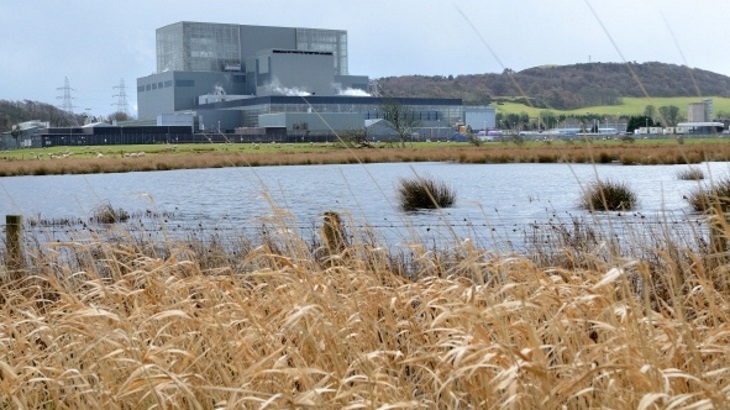Hunterston B-7 (Reactor 3) and Hunterston B-8 (Reactor 4) were shut down last year after cracks were found in the graphite bricks within the reactor cores at the North Ayrshire plant. ONR said its assessment of the safety case to justify a further period of operation for Reactor 3 will start shortly following submission by EDF Energy on 17 June.
"We have made the decision to allow Reactor 4 at Hunterston B to return to service, following a long and detailed assessment of the safety case submitted by EDF Energy," Donald Urquhart, ONR deputy chief inspector said. "My team of expert inspectors, along with an independent panel of graphite experts, have worked for a number of years on the issue of cracking and shrinkage within graphite cores. The licensee, EDF Energy, has completed an extensive programme of work to analyse the condition of the graphite cores at Hunterston B and other reactors in the UK to increase their knowledge and provide sufficient evidence to ensure safe operation," he added.
EDF Energy said the safety case for Reactor 4 had been subject to extensive scrutiny and testing by its own internal Independent Nuclear Assurance, by the Nuclear Safety Committee - a body of independent industry experts - and by ONR. The utility has also worked with the University of Bristol to confirm its understanding of how the core would react in the event of a major earthquake, of a magnitude never experienced in the UK.
In addition, it has been working with consultancies and academics at other universities, including Strathclyde, Glasgow, Manchester, Oxford, Sussex, Nottingham and Durham, as well as with companies such as Fraser-Nash, Wood and SNC-Lavalin. It has also invested more than 1000 person years into the research and invested over GBP125 million (USD152 million) in the programme.
"As a result we have demonstrated that even in the most extreme conditions our reactors operate within large safety margins. In particular, all control rods would operate as they are designed to do and will safely shutdown the reactor in all circumstances," EDF Energy said, noting that this has been agreed with ONR. The company added: "We will continue to demonstrate this safety-first approach throughout the operating lives of our nuclear fleet, up to and beyond the point when we decide to end the generation phase and begin defuelling and decommissioning."
ONR said its team of specialist inspectors had completed an extensive assessment of the detailed safety case submitted by the licensee, EDF Energy, focusing specifically on whether the cracking observed in the reactor graphite core will compromise its fundamental nuclear safety requirements. Its assessment included "extensive scrutiny" of the underpinning evidence provided by the licensee and concluded that an adequate safety case has been provided to allow a further period of operation.
The regulator said it is satisfied that Reactor 4 is safe to operate for the next period and can be safely shut down "in all foreseeable circumstances", including that of a significant seismic event. The core would be able to fulfil its fundamental safety requirements, it said, which are: unimpeded insertion of control rods and unimpeded movement of fuel; ensuring that gas flow will remain adequate to ensure cooling of the fuel and core; and that appropriate moderation (slowing neutrons to sustain the nuclear chain reaction) and thermal inertia (reducing the speed of temperature changes) are maintained.
"Whilst we are content to allow operation for a limited period, the longer term condition of the reactor remains uncertain and the licensee will need to justify safe operation beyond this period," ONR said, adding that it will continue to engage with EDF Energy to ensure all operations are only carried out with a detailed and underpinned safety case.
More information on ONR's decision is available in the Project Assessment Report.







_15863.jpg)







